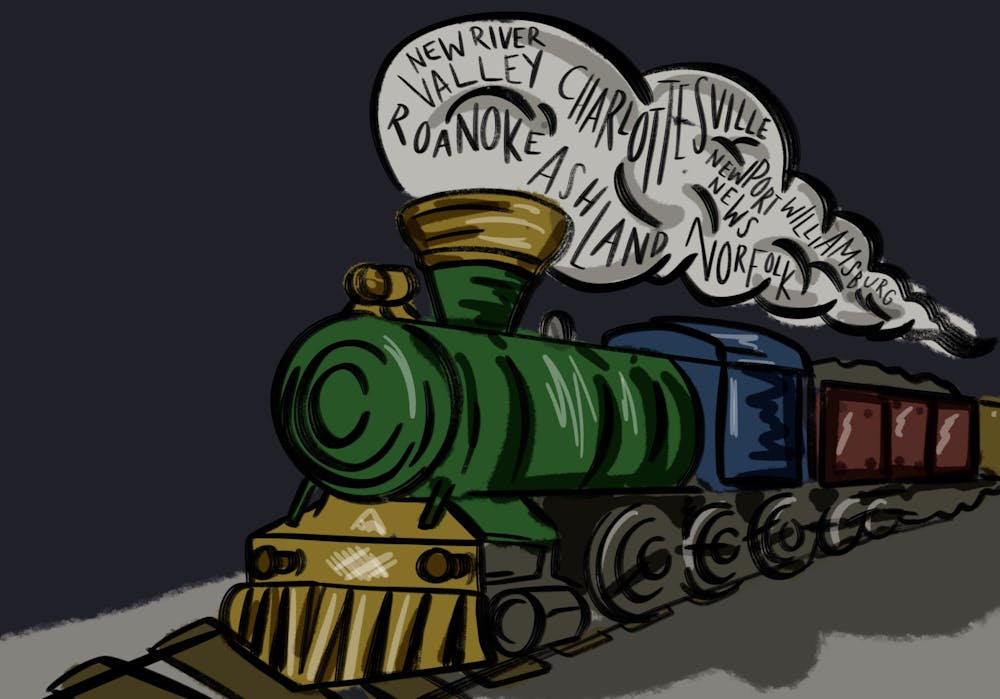The hecticness of post-holiday travel often forces one to reflect on transportation. This January, many University students, especially those who live in NOVA, took a train to return to Grounds. However, for students from Southeastern Virginia, driving is by far the preferable option. Currently, the only train route from Southeastern Virginia to Charlottesville necessitates a stop in Washington D.C. and takes at least eight hours to reach Grounds. This circuitous route is cumbersome and costly. Nevertheless, hope for a quicker train ride should not be lost — the Commonwealth Corridor project, overseen by the Virginia Department of Rail and Public Transportation, is underway and will eventually expand existing train infrastructure with an east-west Amtrak route. Virginians should applaud this new project, recognizing the work done by policymakers to ensure greater transit equity and to improve Virginia’s overall train infrastructure.
Virginia has never been known for its transportation infrastructure, much less for its train system. We use public transportation less than the national average because all of our rail-lines inconveniently terminate in D.C. This means that east-west travel is hugely inconvenient and exorbitantly expensive — paradoxically, it is cheaper for residents from more affluent communities to travel by train as opposed to residents from less affluent communities. The Commonwealth Corridor project, which has only just begun, will remedy this injustice and link Southwest Virginia and Charlottesville to Eastern Virginia with an east-west rail connection. Once finished, these new train lines will perfectly benefit in-state students left behind by the current transportation infrastructure, in addition to Virginia residents more broadly. In short, the Corridor marks an immense success in local transportation policymaking.
The Corridor is one of many projects that has emerged from a growing national impetus, led by the Biden administration, to expand necessary transportation infrastructure. Newfound national consciousness of and funding for public transportation implicitly recognizes the unending benefits of expanding and improving public transportation. Among the stated benefits, public transportation reduces air pollution, creates jobs in transportation and tourism, increases safety of travel, raises fuel efficiency, connects historically underserved communities to job opportunities and, most pressingly for college students, is consistently cheaper than cars. By finally making train travel a viable option throughout Virginia, the Corridor is poised to bring all of these benefits to Virginians. Construction, however, has not yet begun, so Virginians have not begun to feel the benefits of the Corridor. But once finished, it will bring into focus how central public transportation is for any community and reaffirm the Biden’s administration's support for transportation initiatives.
The Commonwealth Corridor actually used to exist — the Amtrak line between Hampton Roads and Charlottesville was closed in the 1980s due to a lack of revenue. Since then, the Corridor’s feasibility has been debated every few years. Because its closure preceded urban renewal movements and overall greater interest in travel to and residence in Southeastern Virginia, there has recently been newfound interest in reviving the Corridor. In fact, recent surveys demonstrate historically high ridership of Amtrak lines in Virginia, suggesting new levels of demand that once again make the Corridor necessary. Given this new demand for train-based transportation, policymakers in Richmond have done well to prioritize the reinstitution of this line.
Despite the myriad benefits of the Corridor, some Virginians still worry about the projected cost — the price tag is a hefty 416 million dollars. But this should not be a source of concern — the General Assembly created the Commonwealth Rail Fund in 2020 which funnels federal and state revenue into rail projects. The fund accumulates roughly 300 million dollars per year, so the CRF will serve as the major source of financial support for the Commonwealth Corridor. A project of this caliber will not rely on funding from just one source, but the CRF will be central. This means that Virginia’s taxpayers will not be footing the entirety of the bill in the next tax season, but they will be entitled to the entirety of the benefits that the Commonwealth Corridor offers.
Good things tend to come to those who wait — and the Commonwealth Corridor is no exception. This project will not only produce the myriad aforementioned benefits but will also demonstrate the crucial relationship between effective and symbiotic national and local policy making. By taking old policies like the Commonwealth Corridor of the 1970s and reengineering it with federal support, Virginian legislators have clearly not only considered the ever-changing needs of residents but also taken advantage of a unique, national moment for public transportation. In short, the Corridor is a necessary and infrastructurally inspiring plan which all Virginians, including University students, should fully commend.
Scarlett Sullivan is an opinion columnist who writes about politics for The Cavalier Daily. She can be reached at opinion@cavalierdaily.com.
The opinions expressed in this column are not necessarily those of The Cavalier Daily. Columns represent the views of the authors alone.







